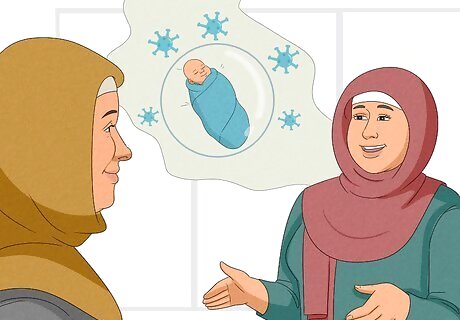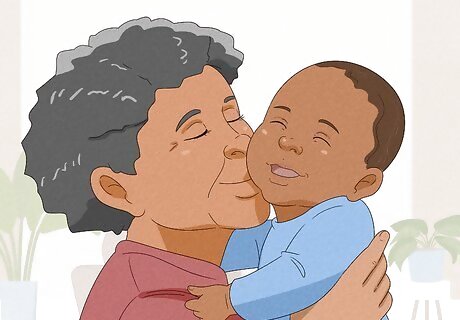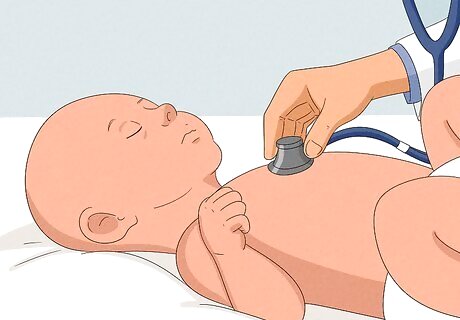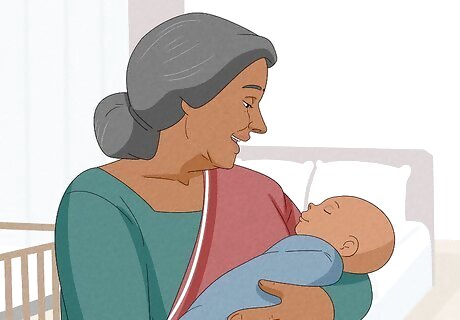
views
- Let people know the no-kiss rule is only temporary, and that it isn’t personal.
- Explain your research: your friends and family may be disappointed, but they may be more receptive to the rule if they understand your reasoning.
- If they don't respect your rule, tell them you are following your doctor’s orders. They may be more receptive to the advice of a medical professional.
- If possible, tell your family about the no-kiss rule before the baby is born. This will give them time to acclimate.
Be kind and respectful.

Take a sympathetic and gentle tone when you break the news. Your friends and family have likely been looking forward to smothering the baby in kisses, so they may be disappointed. Remember that while you have had time to mull your decision over, if they are hearing about it for the first time, they may struggle to contain their disappointment or frustration. If you want to persuade them to follow your rule, try to be as understanding as possible. No-kiss rules are becoming more and more common as research increasingly shows newborns are vulnerable to germs spread through mouth contact, but older generations may not be accustomed to them. “I have some difficult news, Mom. We won’t be letting anyone kiss the baby outside of our immediate family.” “I know you’re upset at this, Uncle Alan, and that makes sense—I know you were looking forward to snuggling the baby.” “I understand you’re disappointed, Aunt Elizabeth. It was a tough decision, but I think it’s the right thing to do.”
Say you are following your doctor's advice.

Some people are more likely to respect the rule if it comes from a doctor. As a parent, you know what's best for your child. Unfortunately, some people are more receptive to the advice of a medical professional. Trying to convince stubborn family members to listen to you can be overwhelming and unnecessarily stressful, but invoking the word of your doctor can make it easier for your family to acclimate to the new rule—which makes it easier on you. Even if your doctor didn’t explicitly enforce a no-kiss rule, it is worth it to your mental health to fib so that you can defuse the situation quickly. “I know it’s unexpected, but it’s what my doctor advised.” “The doctor really thinks this is the best way to keep the baby safe.” “It’s disappointing, but my doctor is the expert, so I trust her advice.”
Explain why you have implemented a no-kiss rule.

Your family may be more understanding if you explain the dangers. Explain to them that babies’ immune systems are still developing in the early months, and that in the meantime, non-immediate family members should avoid kissing the baby. People may be more receptive to your rule if they can understand your reasoning. While non-immediate family members’ kisses can be dangerous to the baby, a mother’s immune system offers the baby protection, meaning Mama can kiss and breastfeed her baby and it not only won’t harm the baby, it will protect them. “I know, I didn’t realize how vulnerable babies were at this age until I did the research! I’m glad I learned!” "I know this is surprising and disappointing news. If you would like to talk about it more, I would be happy to explain my reasoning in more detail." “After the first few months, the baby will need to work on strengthening his immune system—that’s when he’ll really be needing your kisses!
Say the no-kiss rule is only temporary.

Assuring them it’s not permanent will alleviate some disappointment. Most babies’ immune systems will be strong enough for kisses after 2 to 3 months. Until then, it’s healthiest not to kiss the baby, painful though it may be. “The baby will need your kisses in a few months!” “Keep looking forward to the time when she’s old enough to be snuggled! It’ll come soon enough!” “It’s just for a little while. The time will fly by like that.””
Prioritize your baby’s health.

Remind everyone the baby’s health is more important than their feelings. This news may be disappointing to some of your friends or family members, and it may cause them to prioritize their own hurt feelings over the wellbeing of the baby. Remind them you aren’t making the rule for no reason, and that they should prioritize the health of the baby over their own feelings. It’s also worthwhile to remind yourself why you are taking this stand: it may be uncomfortable standing up to your loved ones, but keeping feathers unruffled is less important than ensuring your baby grows up happy and healthy. “I know you’re hurt, Dad, but don’t lose track of what’s really important: the baby’s health.” “I hope we can put hurt feelings aside and prioritize the baby’s development.” “I know it’s a blow, but aren’t the baby’s health and wellbeing more important than being able to kiss her?”
Hype up ways to show the baby affection without kissing.

Downplay the disappointment by letting family know what they can do. Depending on your level of comfort, people can still cuddle the baby and play with the baby. Encouraging people to look on the bright side will remind them a no-kiss rule isn’t the end of the world, and that there’s still lots to be excited about. In fact, while kissing may pose a risk to the baby’s health, newborns greatly benefit from frequent cuddles. Present Grandma’s cuddles as integral to the baby’s development, and she may be receptive to the no-kiss rule.
Make sure they know the no-kiss rule isn’t personal.

Reassure your friends and family it’s not about them. They likely want what’s best for the baby, and may feel hurt at the implication they could pass on germs to your child. Ease their anxieties by assuring them it’s not personal, and that you don’t feel comfortable with anyone kissing your baby (just for a little while!). Remember that many infections or viruses that are merely uncomfortable to adults, such as cold sores, are painful or dangerous for infants. “It’s not a reflection on you, Aunt Margaret. The baby is just too vulnerable right now.” “Even someone who doesn't feel sick could be carrying germs. I just would rather not take any chances.” “I’m not letting anyone kiss the baby right now. But in a few months, she’ll be more than happy to be smooched.”
Be calm and don’t get defensive.

Keep the situation from escalating by remaining level-headed. They may think you’re overreacting—they may even tell you so. Remind yourself that you are in control. Whether or not your family and friends agree with you, you have the final word when it comes to the well-being of your child. "I know you are upset, Uncle Rich. I hope you will come and see the baby even if you can't kiss her." “I’m really counting on you being there for the baby, even if kisses aren’t allowed.” “Take all the time you need to process the news. I’m sorry, it’s just the way it has to be.”
Hold your ground if anyone resists your rule.

If Grandma pushes too much or flouts your rule, be firm. Your baby’s grandmother may be hurt and disappointed, but she must still respect your decision. If she responds negatively or ignores you, telling her she cannot see the baby until she respects your wishes may emphasize the seriousness of your rule. If you struggle to be confrontational, it may help to write down what you want to say before you sit down with your friends and family to discuss your rule. You might even explain your rule in a text or email to avoid direct confrontation (and to allow the recipient time and space to collect their thoughts before replying). “I know you are disappointed, Aunt Mary, but please respect my wishes.” “I hate to hurt you, Gramps, but I am my baby’s mother, and I have the final word.” “I don’t feel comfortable with you near my baby until you can respect my rule, Aunt Becky.”
Enlist supporters to help you enforce the rule.

Ask your partner or friends to back you up. If you are struggling to convince friends or family not to kiss your baby on your own, recruit your partner or other sympathetic people to join your cause. Those resistant to your rule may be susceptible to positive peer pressure. In particular, if it's your in-laws who are resisting, support from your partner may go a long way toward ensuring you maintain a good relationship.
Tell people your rule before the baby is born.

Prepare everyone early to soften the blow. If you can express your boundaries to your friends and family before the baby is born, it will give them time to adjust to your expectations before the baby is in the picture. Unspoken boundaries can lead to misunderstandings and hurt feelings. If you wait until after the baby is already born, it may be a bit harder to bring everyone around to the idea that the baby isn’t to be kissed.


















Comments
0 comment